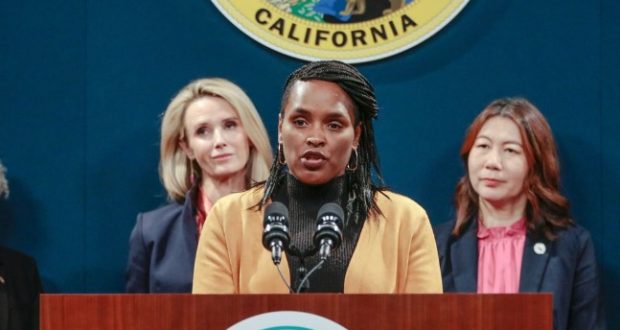By Tanu Henry | California Black Media
Last week, California First Partner Jennifer Siebel Newsom announced five cities — Oakland, San Francisco, Los Angeles, San Diego, Long Beach, and Fresno — have signed the California Equal Pay Pledge.
“The pledge is a The California Equal Pay Pledge is a partnership between the Office of the First Partner Jennifer Siebel Newsom, the California Commission on the Status of Women and Girls, and the California Labor and Workforce Development Agency to turn the strongest equal pay laws in the nation into the smallest pay gap in the nation,” according to the governor’s office.
Kimberly Ellis, Director of the San Francisco Department on the Status of Women, said closing the gender gap is something California “must do.”
“From building credit to building wealth, we know that the wage gap has greatly hindered progress toward actualizing women’s equality,” says Ellis. “The City and County of San Francisco is proud to support the First Partner’s initiative and look forward to doing our part to making pay equity a reality for all women in the Golden State.”
Siebel Newsom said public and private partnerships are essential to closing the gender gap.
“Pay inequity stems from a patriarchal system that was not built with gender equity in mind, but instead built to keep money and power in the hands of few men in control,” she said.
California Black Media is following up with a report on gender and employment that focuses on data specific to Black women.
State Invests $1 Billion in New Homelessness Funding
Last week, Gov. Newsom announced $1 billion in new funding for local communities to address homelessness and take emergency action to construct new homes to move unhoused Californians off the street.
Homelessness remains one of the state’s most stubborn problems as California’s homeless population keeps mushrooming, growing to approximately 160,000 people (about half the population of homeless people in the United States). Per every 100k people, California’s homeless population ranks third after New York and Hawaii.
“In California, we are using every tool in our toolbox – including the largest-ever deployment of small homes in the state – to move people out of encampments and into housing,” said Newsom. “The crisis of homelessness will never be solved without first solving the crisis of housing – the two issues are inextricably linked. We are tackling this issue at the root of the problem by addressing the need to create more housing, faster in California.”
Under his new plan, Newsom has deployed the California National Guard to assist in the preparation and delivery of approximately 1,200 small houses free of charge to four local communities: Los Angeles (500 units); San Diego County (150 units); San Jose (200 units) and Sacramento (350 units).
Former Black Caucus Member Jim Cooper Appointed to State Commission
Last week, Gov. Gavin Newsom appointed former Assemblymember and current Sacramento County Sherriff Jim Cooper, a Democrat, to the Commission on Peace Officer Standards and Training (POST).
The California Legislature created POST in 1959 to “set minimum selection and training standards for all law enforcement in the state,” according to the office’s website.
Cooper was elected to the Assembly in 2014 and served until last year representing the 9th Assembly District in Sacramento County.
Uber and Lyft Drivers Can Be Contractors, State Court of Appeals Rules
Last week, the California Court of Appeals ruled that Uber and Lyft drivers and other freelancers can be classified as independent contractors. The court’s decision came after a long fight dating back to 2019 when AB 5, the law that first reclassified contractors as employers, passed. The next year, AB 5 was challenged and overturned when voters approved Prop 22 – a ballot measure that gave rideshare companies the greenlight to hire freelancers.
San Diego Based Civil Rights Activist Shane Harris Appears on the Dr. Phil Show
The Rev. Shane Harris, a national Civil rights activist who is based in San Diego, appeared on the Dr. Phil show last week titled “How Safe Are Our Streets?”
The episode focused on victims of random violent crimes who were attacked by repeat offenders.
“The news and the media are running a lot of stories about these reoffenders and these folks who have committed violent offenses consistently, but they are not telling you about the youth who turn their lives around, people who went through diversion programs that actually work,” said Harris, who is President of the Peoples Association of Justice Advocates, speaking up for criminal justice reforms that rehabilitate criminals.
Harris was on the panel making his argument against the positions of law enforcement advocacy groups calling for a tougher penalty for crimes.
“Tough on crime didn’t works for us,” says Harris. “There is a balance we need to strike in the middle of this.”
California Turns San Quentin Prison Into “Rehabilitation and Education” Center
Last week, Gov. Newsom announced that the state is transforming California’s most notorious maximum-security prison San Quentin, — known for having the largest Death Row in the United States — into the country’s largest rehabilitation and education center.
The prison renamed “San Quentin Rehabilitation Center,” will operate under the direction of an advisory group comprised of public safety and rehabilitation experts.
“California is transforming San Quentin into the nation’s most innovative rehabilitation facility focused on building a brighter and safer future,” said Newsom, standing with legislators, civil rights leaders and victim advocates. “Today, we take the next step in our pursuit of true rehabilitation, justice, and safer communities through this evidence-backed investment, creating a new model for safety and justice — the California Mode — that will lead the nation.”
 Westside Story Newspaper – Online The News of The Empire – Sharing the Quest for Excellence
Westside Story Newspaper – Online The News of The Empire – Sharing the Quest for Excellence





